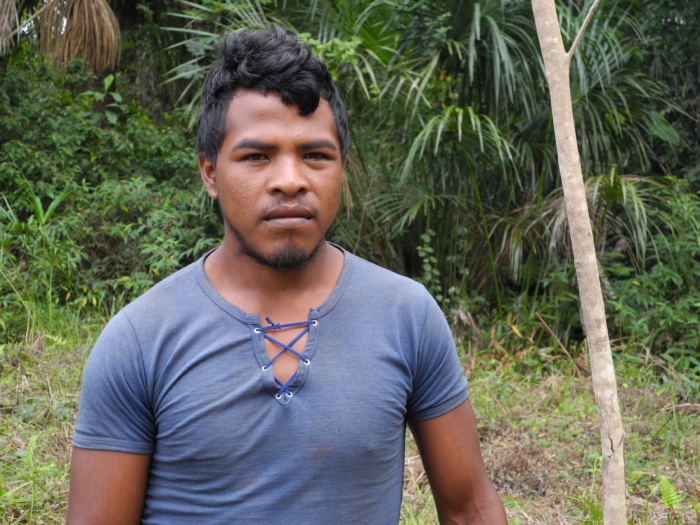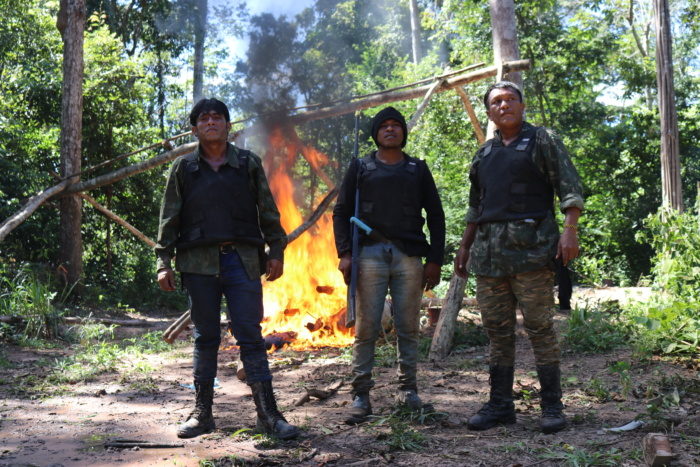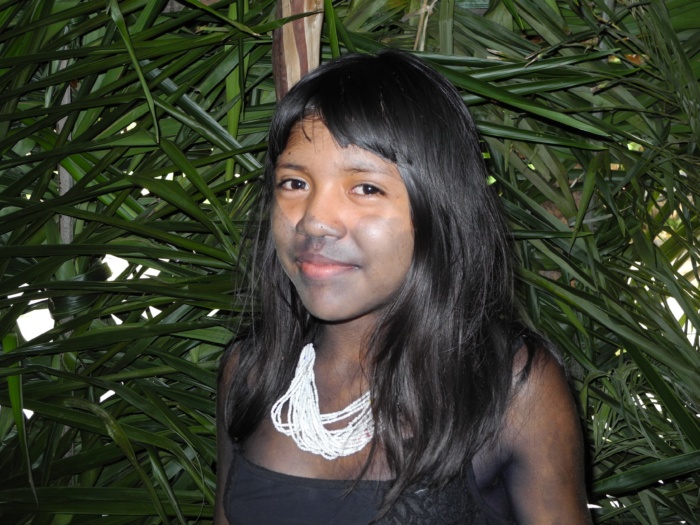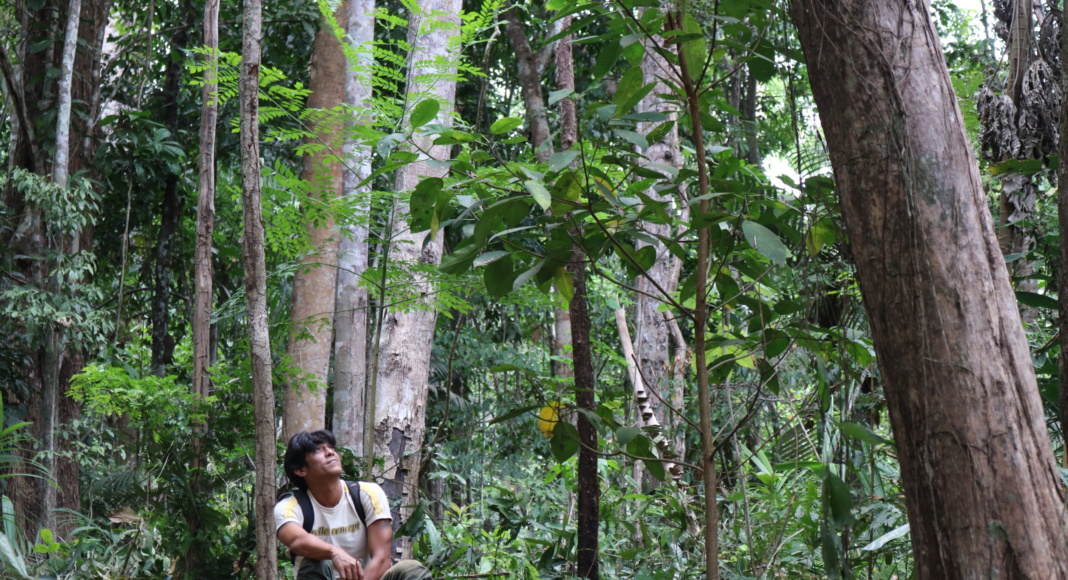A year ago, Paulo Paulino, a Guajajara Indian, was murdered, with the assassination reverberating around the world.
To mark the anniversary of his death, Fiona Watson, director of advocacy at Survival International and a member of LAB’s council, has written two articles.
In the first, she interviews Paulino’s cousin Tainaky, who witnessed his death. In the second, she describes the violence spreading across the state of Maranhão, where the Guajajara people live.
Tainaky Tenetehar, or ‘Green Pepper’ in his native Guajajara language, is a marked man. One year ago he and his cousin Paulo Paulino were ambushed while hunting by a logging gang operating illegally in their Amazon forest homeland, the indigenous territory of Arariboia in the state of Maranhão in Brazil.
Paulo was killed almost instantly and Tainaky was badly wounded but managed to hide in the forest and survived. He lives in fear of his life following the attack and death threats.
Paulo’s murder reverberated around the world. Nicknamed ‘Lobo’ or Wolf, he was a member of the Forest Guardians, a group of indigenous people of the Guajajara tribe who came together in 2012 to defend their forest from the increasing invasions of loggers and landgrabbers. Today the Guardians are on the frontline in one of the most violent regions of the Amazon.

The Guajajara have had a long and bloody relationship with outsiders since they first came into contact with settlers 300 years ago. Conflicts intensified from the 1960s onwards as loggers, ranchers and speculators poured into the region along the ever-expanding network of roads and the railway line built by the Vale mining company to transport iron ore from its huge Carajás mine.
The Guajajara depend on the forest for their livelihood. Game meat and fish are highly appreciated, though scarce due to heavy poaching by invaders. They grow a variety of crops like manioc, corn, beans, squash and melon in forest gardens, and cultivate 30 different types of fruit and palm trees.
Tainaky wanted to mark the first anniversary of his friend’s death and remind the world of the vital but often unseen work of indigenous peoples who put their lives at risk to protect the world’s last forests for the benefit of humanity.
FW: How does Lobo’s spirit live on?
TT: Lobo was a great ‘guerreiro’ (warrior) and had a good heart. He always talked about fighting for the forest. We often went out hunting together. When I think of him, I remember only the good things and the great times we spent together. We decided to adopt pseudonyms so that we couldn’t be recognised by the karaí (non-indigenous people). He thought Lobo would be good because wolves move so well in the forest. Sometimes we recognise the karaí we catch on our land because we used to go to the local towns to play football, but most we’ve never seen before. After we formed the Guardians we stopped going into these towns because it was too dangerous.

FW: What does the forest mean to you?
TT: The forest for me is life. Everything in it is alive. It’s total liberty for us. When I see the birds flying I feel so happy that they are not caged. I especially like the macaws and the jaguars. Everything is in the forest and we eat what we want there. It is peace. Tupan, the creator, made everything and Maíra is the protector of the forest and all things that live in it. Maíra is a super-natural being and his role is to defend the forest with us, but he isn’t happy. It was Maíra who got into our heads and got us thinking of forming the Guardians.
FW: How do the Guardians carry out their operations?
TT: At first we’d destroy the invaders’ equipment – the chain saws, the trucks and the bull dozers they used to make roads. Then we decided to catch people because we were criticised for just destroying their equipment. So we thought right, we’ll catch the invaders and take them to the police. We did this several times, but they were always released the next day. They were never brought to justice or punished. In fact, the invaders denounce us when we detain them and say we assaulted them and get arrest warrants, so we end up in prison as if we were the bandits. I was once imprisoned for almost a month for defending the forest. They didn’t even listen to me – I was just thrown into jail. I only got out because my mother raised money to pay for a lawyer. The law regards us as criminals, and FUNAI (the government indigenous affairs department) doesn’t defend indigenous peoples even when we are defending life itself.
FW: What’s the role of the Guajajara women in protecting the forest?
TT: They’ve been organizing themselves recently. Each region will have a co-ordinator. We need to choose real warriors. Then they will have to decide what type of work they will do and how they will work with the men. For example, will they raise awareness in schools? We need to raise awareness among those who are destroying our lives. We need to help in this, to show them how we identify the trees and fruits and trails – how we know our land so deeply. The women want to help us and to give us more courage and strength in our fight. They know how important the land is. They have always supported and helped us in our work and meetings. But they don’t want to just talk any more. They want to fight too in defence of our rights. It’s great that women are rising up everywhere in the world! That’s good for us all.
FW: What’s happening to the uncontacted Awá?
TT: The uncontacted Awá are suffering a lot because the loggers are closing in and destroying everything. The Awá have been here since the beginning of time, over a 1,000 years ago. The white people came to us, the Guajajara, a long time ago. They told us we were not ‘civilised’ and that things would get better. They contacted us and then forgot us – we are an example of what happens with contact. All this time later we are still looked down on. We think a lot about this and know it will be the same for the Awá if the karaí, the white people, contact them. The Awá will die from disease brought with contact. They don’t want contact with us or anyone.
They are our root – we are their descendants. We don’t want them to disappear. They are one of the unique peoples of the earth. They are important because they live, as Tupan the creator showed us, without destroying nature or people. The government says they are not ‘civilised’, but I think it’s the government which isn’t civilised. Civilised people don’t destroy plants and trees for profit, for money and luxuries. The Awá are more civilised than any people because they don’t destroy. They are happy and only want to live in the forest in what’s left to them. There is game there but all around the forest has gone. Our concern is to protect the game, the fruits and the lives of the Awá so that they along with us, can resist the outsiders.
FW: Do you get any support from the authorities?
TT: No politicians help us, and we don’t trust the local ones. In Amarante, for example, the regional environment secretary is hand in glove with the loggers. Nor do we trust the police. The governor of Maranhão’s security secretary turned up after Lobo’s death saying they would help us because he had been murdered. But the killers are still free. It was just talk. They summoned the killers to the police station but only for a chat, then they let them go. One year later they say they are still investigating. But nothing is happening. They are deceiving us.
FW: How important is international pressure?
TT: A few years ago, the world didn’t know about our fight or the conflict. Then the media came and spread the word and the world started to pay attention and see the growing neglect of the Brazilian government. They saw things from our point of view, in a good light. It’s important to show what’s going on – Survival has helped a lot to spread the word.
Things got a bit better after international pressure. Before, there was almost no monitoring of our land. Three or four years would go by with no monitoring. After Survival supporters sent loads of emails to the government things changed a bit. They want to show the world they are good and helping the Indians. So they did annual inspections, but it’s not enough. They always do this when there is a lot of international media attention. They go in and inspect, but they don’t arrest the loggers or remove them. So the invasions carry on.
After Lobo was killed the invasions started again. When the fires come it’s even worse as the branches are dry and are fuel for the fires. There’s also biopiracy, for example bark is being stolen from the quina trees to make quinine. When they strip the bark, the tree dies.
I’ve just got some video footage of an invasion up on the plateau – they are felling really big trees. The loggers have never left. Anyone can see them, yet the state contradicts us saying they are monitoring everything.
International pressure on the government to defend indigenous peoples’ rights in the whole country, not just the Guajajara’s rights, is important. The media showed the massive theft of indigenous lands in Brazil and how some people are thrown out and living on the roadside, and how some are committing suicide in despair because there are no trees left and no food. It’s important to show our fight in Brazil. The Indians are looked down on by the government. There is a lot of prejudice – they don’t want us to live in our way.
Progress for us is the forest alive because it has all that we need to survive. We lived well before the karaí came to Brazil – we were healthy, plump and strong. But not today. Indigenous peoples don’t enjoy good health and we don’t have land. This discrimination has to end. We simply want to live in the forest.
FW: How do you see the future?
TT: With all the destruction and devastation, the earth is losing its vitamins. How the forest grows depends on how we treat it. If you make a garden plot in the forest and leave lots of green roots they will grow again when the rains come. But with total destruction, the earth will become petrified and the roots won’t revive. The rain will stop and won’t soak the earth, which will become like the towns of the white people. When I visited these places, I tried to imagine the forest, but they only have scrubland and the earth is rock hard. So it’s impossible for the forest to grown back. The amount of forest the white people have destroyed is immense. We need to protect Arariboia while there is still time. If not, we the Guajajara and the Awá will become extinct.
My dream is that there will be no invasions and that the forest will recuperate, that the fruits will grow and the game will come back. My grandparents brought us up on manioc, fish and game meat. Meat is very important but there is scarcely any game left now. The curassow and tapirs are nearly extinct – they have all fled to the heart of our land.

The sacred ritual marking young girls’ first menstruation won’t happen if we can’t get lambutona (large tinamou bird) meat. We always bless the health of the young girls – it’s part of our culture. None of our festivals will take place if we have no forest foods. The honey festival, hair zegar haw, is very important too. We collect honey from the wild forest bees without destroying them or the trees, but now the bees have gone. If we can’t celebrate the young boys’ festival this will be really, really bad too.
The forest is our culture and we don’t want it to disappear. We want to exist for ever. We are people, we have emotions, brains, thoughts – we feel everything.
I’m optimistic – we shall continue to fight even if the Brazilian state, the invaders, the gunmen, the loggers and the ranchers kill us. A lot of my people have died defending our land. Our grandparents fought for the demarcation of our land. Their blood was spilled and they died for it. But while I’m alive and breathing I will fight for our children and grandchildren and I’ll carry on until our land is protected. We were born as Guardians, since the moment we opened our eyes. We Guardians will not sit with crossed arms, we shall fight until the very end.
One final word… “Paulo presente!” – Paulo is always with us!
To support the Guajajara Guardians, visit: https://www.survivalinternational.org/emails/guajajara_guardians

